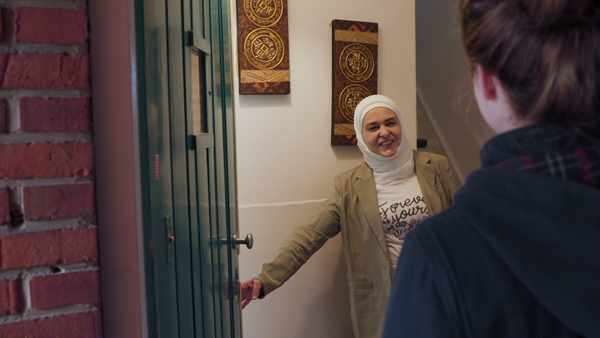Integration of newcomers is almost at a standstill
The lockdown in March 2020 was difficult for everyone in the Netherlands, but especially so for newcomers: they had 50% less contact than previously. As a consequence, they felt lonelier and their integration into society has almost come to a standstill. These are the conclusions of research into the psychological consequences of the first lockdown on newcomers. This study is being conducted by a team of UG researchers and students as well as external organizations Groningen Verwelkomt and Heel Groningen Helpt and three Syrian supporting researchers. The research results and policy advice are presented in a video and will be explained in an online webinar on 3 December (from 4 to 5 p.m.).
Loneliness
Evert Sulman from Groningen Verwelkomt is committed to supporting the coexistence of old and new Groningen residents. During the current times of the coronavirus, he started the initiative Heel Groningen Helpt. The initiative is intended to coordinate neighbourly support for people who have little to no network while the coronavirus restrictions are in place. Together with Sulman, UG social and cultural psychologist Nina Hansen, UG students and Syrian supporting researchers investigated the experiences of newcomers during the first lockdown and the things that they found valuable. The results are shocking: during the first lockdown, newcomers had 50% less contact. Although they were able to maintain contact with friends and family from their country of origin, they lost contact with their Dutch colleagues, classmates, volunteers and/or neighbours. The more contact they lost, the lonelier they felt.
Research input from UG students and external Syrian researchers
Under the leadership of Nina Hansen, psychology students Eline Heikamp and Helena Pünjer developed their research approach together with three external Syrian researchers. By allowing people to tell their stories in their own mother tongue in a structured way, the researchers hoped to gain more insight into the situation of newcomers. The interviews were conducted by Sama Alaloush, Adham Elias Botrous and Majd Jabbour. They asked over 60 Syrian people in their networks to draw their social map: where they went on a daily basis before the pandemic, such as work or school, who they had contact with there and which places on their personal social map gave them a feeling of being welcome or not. The researchers also asked them about their general wellbeing.
Language-learning and sharing talents
Sama Alaloush emphasizes the importance of language-learning when finding a place within Dutch society. In the partially closed language and civic integration schools, teaching is focused on grammar and vocabulary. But according to the study participants, speaking Dutch in daily life is much more important. At the moment, newcomers have very few possibilities to practise their Dutch. Majd Jabbour concludes that newcomers in Groningen would like to meet Dutch people with the same talents and interests. This can connect people and help them to learn from one another, so that newcomers can orient themselves more easily and find their way in the labour market more smoothly. But those who live in the countryside especially feel the need to speak Dutch. They made it clear that they would like to join social gatherings, to find their place and participate in local society.

Recommendations
On the basis of their results, the team has proposed two main recommendations for municipalities, the government, organizations and volunteers:
1. Facilitate opportunities for newcomers to stay in contact with their acquaintances in the Netherlands and also get to know new fellow Dutch citizens. This can also take place online at the moment, via online gatherings or outside activities such as a “walk and talk”.
2. Some newcomers are afraid of rejection or are uncertain about the way in which they should initiate contact. Through training sessions and consultations, newcomers could be encouraged to pursue connections.
Webinar on approaches for the practical field
On Thursday 3 December, a webinar will be held from 4 to 5 p.m. During this webinar, the manners in which municipalities and organizations can encourage integration in times of social distancing will be discussed. Jorrit Hoekstra (independent researcher, consultant and coordinator of projects on migration, integration and polarization) will host a conversation the project team on their experiences and recommendations for the practical field, after which there will be time for answering questions. Christian de Kraker (teacher-researcher at Alfa-college, member of the board of Vlucht Voorwaarts) will close the meeting with suggestions for follow-up actions to also be able to facilitate integration during winter months. The webinar is open to civil servants, policymakers, volunteers, students and anyone else who is interested in the research results and consequent recommendations for the practical field.
More information
- Nina Hansen
- Video
- Website
- Webinar on 3 december between 4 and 5 p.m.
| Last modified: | 25 January 2022 2.52 p.m. |
More news
-
16 May 2024
KNAW appoints Mladen Popovic and René Veenstra as members
Professor Mladen Popovic and Professor René Veenstra have been appointed members by the Royal Netherlands Academy of Arts and Sciences (KNAW).
-
13 May 2024
Trapping molecules
In his laboratory, physicist Steven Hoekstra is building an experimental set-up made of two parts: one that produces barium fluoride molecules, and a second part that traps the molecules and brings them to an almost complete standstill so they can...
-
01 May 2024
Behavioral Scientist Carsten de Dreu Appointed as Professor at the University of Groningen
The University of Groningen is pleased to announce the appointment of renowned social and behavioral scientist Carsten de Dreu as research professor at the UG.
